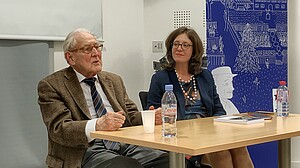Teaching the work of the European Union at the Strasbourg School of Management, Sabine Menu realised that her students lacked knowledge of this theme. And this partly due to the limited information available on Europe in the media. Writing the biography of Paul Collowald, one of the last pioneers of European construction, provided an opportunity for her to put the subject in the spotlight in the perspective of the forthcoming European elections.
"Despite the multiplication of communication tools to explain what Europe is doing today, people are still quite ignorant and indifferent," says Sabine Menu, who points out that the problem is also at the level of States and European institutions. "What is more serious is that in failing to understand, people are starting to reach the end of their tether with respect to Europe. We need to give back information and meaning. That's what stimulated me to write now."
The same enthusiasm
The political scientist crossed the path of Paul Collowald during a conference on the 60th anniversary of the Treaties of Rome, in March 2017, in Brussels. "He is a 95-year-old gentleman of great eloquence and perfect memory. He lived through the annexation of Alsace and the Moselle, the war like Malgré-Nous (Despite-Us where Alsacian men were conscripted into the German army), and it is from this that his European committment was born. A visceral commitment, to have a united Europe has been his purpose in life", recounts Sabine Menu who shares the same enthusiasm and the same concerns for the European Union. "My mother is German and I am married to an Italian I met during an Erasmus stay. If the borders had been sources of tension, as in the days of Paul Collowald, everything would have been different ... In our enthusiasm, there is also our story."
From this meeting, she wrote a book "Paul Collowald, pioneer of a Europe to be united. A life beyond borders." Over the course of the book, Sabine Menu takes stock of the results of the information on Europe from the 40 interviews conducted with Paul Collowald, but also with regard to the writings published in the field. "Paul Collowald, a former journalist and spokesman for the European Commission, takes a critical view of how little Europe has been in the media. Even today, he sifts through the news he receives every day through different channels."
"The big loser is the citizen"
His testimony helps to better understand the origin of this lack of information. "The EU is always concerned not to offend the States. It does not want to explain too much so as not to overshadow the nations, but the big loser is the citizen", says Sabine Menu, evoking an example of omission with the Youth Guarantee. "This is a widespread professional integration scheme in France in 2017. In May 2018, the Figaro dedicated an entire page and mentions at the end of the article that "European funds" intervene, without explaining that the scheme comes from a Commission initiative approved by the Member States in 2013". A missed opportunity to say what Europe is achieving according to the researcher.
This lack of information also leaves room for false information. "My concern is that in the European elections of May 2019 people will not make an informed decision. With Brexit in the lead and some fake news that has tipped the vote to the image of the assertion that, according to the Brexiters, leaving Europe would transfer 350 million pounds per week to the National Health Service. The Brexiters demolished that concept the day after the referendum! I think that at the university, we also train citizens", concludes Sabine Menu.
Paul Collowald, a life serving Europe
Good to know
Born in Alsace, Paul Collowald suffered through the annexation of Alsace and the Moselle. Resistace fighter, forced into the German army and escapee, he fought against attacks on human dignity. In 1949, while a journalist in the Nouvel Alsacian, Paul Collowald met Foreign Minister Robert Schuman. In 1953, he became Le Monde's correspondent in Alsace. After working on the launch of the University Centre for Teaching Journalism (CUEJ) in 1958, he took the entrance exams for the European civil service. He then served as spokesperson for the Commission's successive Vice-Presidents, Robert Marjolin and Raymond Barre. Director of the Directorate-General for Information, he then ended his career in the European Parliament as Director General of Information and Chief of Staff to President Pierre Pflimlin.
















